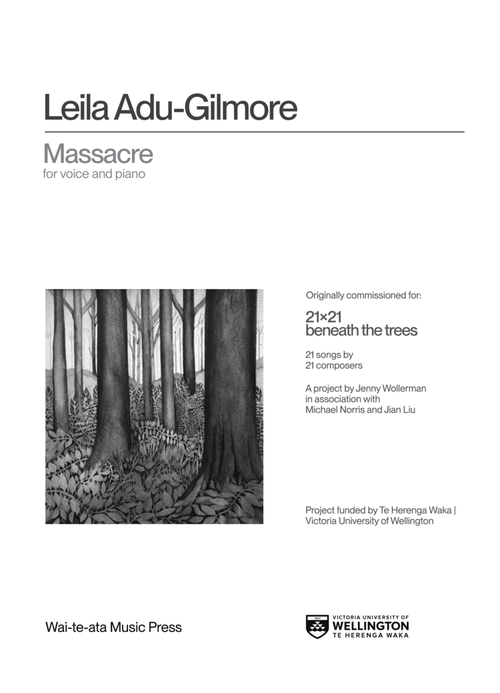Description:
There is a pristine colonial manicured garden city filled with a radical underbelly of musicians, artists, and activists; this is Christchurch. I grew up in a place where I encountered racist experiences, from being a little girl being called the ‘N’ word at school, to countless other microagressions that I thought were normal and that made me feel like I did not belong; this place is also Christchurch. These competing notions of this place I called home shaped how I view the world today. I’m proud of this community and the interconnectedness that people showed each other during and after the 2011 earthquake; yet these two Christchurches still exist and led to the events that inspired this piece. When I was asked by Jenny Wollerman to work with a New Zealand female poet, I thought of Tusiata Avia whom I’d met years before in New York. When I saw her poem ‘Massacre’ I immediately knew that this was a song I could write: it resonated on so many levels. When the Christchurch massacre happened, I’d just started teaching at New York University (NYU). I heard a Muslim leader on the news say that the public could support the community by going to mosque in solidarity (I’d never been to one). I went to the NYU mosque and saw the community there—everyone mourning, a girl in tears because she felt so scared that people were coming to attack them. They asked me to speak on behalf of faculty—and as someone from Christchurch—along with interfaith leaders, a Christian priest, a Muslim imam and Jewish rabbi. The feeling of togetherness was palpable. When I saw this poem, I knew that I needed to make this a piece of music as a remembrance. This is not an easy poem or piece, but it’s real. The massacre really happened and we must never forget that ignorance can take violent forms, and that we must be vigilant in our daily quest for peace. The piece sets two sections of the complete poem. It begins with the ‘Thursday 14 March’ section, with dreamy birdlike piano moving to lower driving chords that become blurred, and an abstract vocal style including microtones, influenced by Māori waiata. In the second selected section ‘Sunday 17 March,’ I demonstrate the opposites and irony of the poem, as I move through different textures in the vocals and piano, edging towards schmaltzy and romantic, juxtaposed with brutalist Russian Ustvolskayan piano. The piece develops into arpeggios reminiscent of Schubert’s Winterreise but laced with Arabic scales.
 Loading... Please wait...
Loading... Please wait...
